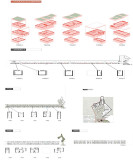In 2023, the Thessaly region was devastated by the catastrophic storm "Daniel," leaving many areas in a state of emergency. The widespread destruction of infrastructure, including transport networks, embankments, and canals, along with the lack of water, energy, and basic necessities, severely disrupted the normal lives of residents. Entire villages and numerous agricultural, livestock, and processing businesses were obliterated.
Keramidi, a village in the municipality of Farkadona, was among the hardest hit. Most of its residents have yet to return as their homes remain uninhabitable. They are currently being sheltered in neighboring villages and the refugee hospitality structure in Koutsochero, near the city of Larissa. The complete destruction has driven many young people to seek employment abroad.
This work focuses on the systematic political and technical investigation and the design of a proposal for relocation and reconstruction in a safe location, aiming to create a new environmentally secure community. A key political-technical aspect of the new community will be sustainable self-management, engagement in the primary production sector, and comprehensive processing of natural raw materials (agriculture-livestock). Moreover, the proposal includes new functions alongside traditional roles in administration, religion, and collective relations, such as a research and education center on environmental and sustainability issues, support units for education, hospitality, and communal living.
The proposed special plan is a continuously evolving project, providing opportunities for political and architectural contemplation, and allowing for additional co-formulations of its program. It is envisioned as a starting point for discussions on revitalizing the Thessaly region, fostering the creation of active social hubs in areas that have lost such vital community structures.







